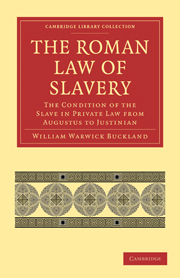Book contents
- Frontmatter
- PREFACE
- Contents
- ERRATA, ADDENDA, AND LIST OF ABBREVIATIONS
- LIST OF PRINCIPAL ABBREVIATIONS
- PART I CONDITION OF THE SLAVE
- PART II ENSLAVEMENT AND RELEASE FROM SLAVERY
- CHAPTER XVII Enslavement
- CHAPTER XVIII Enslavement (cont.)
- CHAPTER XIX Outline of Law of Manumission during the Republic
- CHAPTER XX Manumission during the Empire. Forms
- CHAPTER XXI Manumission during the Empire (cont.). Manumission by Will (cont.). Dies, Conditio, Institutio
- CHAPTER XXII Manumission during the Empire (cont.). Fideicommissary Gifts
- CHAPTER XXIII Manumission during the Empire (cont.). Statutory Changes
- CHAPTER XXIV Manumission under Justinian
- CHAPTER XXV Manumission. Special Cases and Minor Restrictions
- CHAPTER XXVI Freedom independent of Manumission
- CHAPTER XXVII Freedom without Manumission. Uncompleted Manumission
- CHAPTER XXVIII Questions of Status as affected by Lapse of Time, Death, Judicial Decision, etc.
- CHAPTER XXIX Effect after Manumission of Events during Slavery. Obligatio Naturalis
- APPENDIX I The relation of the contractual actions adiectitiae qualitatis to the Theory of Representation
- APPENDIX II Formulation and Litis Consumptio in the actions adiectitiae qualitatis
- APPENDIX III Form used by Slave in acquisition by Mancipatio, etc.
- APPENDIX IV The essential character of Manumission: Iteratio
- APPENDIX V Manumission vindicta by a, filiusfamilias
- INDEX
CHAPTER XXI - Manumission during the Empire (cont.). Manumission by Will (cont.). Dies, Conditio, Institutio
Published online by Cambridge University Press: 07 September 2010
- Frontmatter
- PREFACE
- Contents
- ERRATA, ADDENDA, AND LIST OF ABBREVIATIONS
- LIST OF PRINCIPAL ABBREVIATIONS
- PART I CONDITION OF THE SLAVE
- PART II ENSLAVEMENT AND RELEASE FROM SLAVERY
- CHAPTER XVII Enslavement
- CHAPTER XVIII Enslavement (cont.)
- CHAPTER XIX Outline of Law of Manumission during the Republic
- CHAPTER XX Manumission during the Empire. Forms
- CHAPTER XXI Manumission during the Empire (cont.). Manumission by Will (cont.). Dies, Conditio, Institutio
- CHAPTER XXII Manumission during the Empire (cont.). Fideicommissary Gifts
- CHAPTER XXIII Manumission during the Empire (cont.). Statutory Changes
- CHAPTER XXIV Manumission under Justinian
- CHAPTER XXV Manumission. Special Cases and Minor Restrictions
- CHAPTER XXVI Freedom independent of Manumission
- CHAPTER XXVII Freedom without Manumission. Uncompleted Manumission
- CHAPTER XXVIII Questions of Status as affected by Lapse of Time, Death, Judicial Decision, etc.
- CHAPTER XXIX Effect after Manumission of Events during Slavery. Obligatio Naturalis
- APPENDIX I The relation of the contractual actions adiectitiae qualitatis to the Theory of Representation
- APPENDIX II Formulation and Litis Consumptio in the actions adiectitiae qualitatis
- APPENDIX III Form used by Slave in acquisition by Mancipatio, etc.
- APPENDIX IV The essential character of Manumission: Iteratio
- APPENDIX V Manumission vindicta by a, filiusfamilias
- INDEX
Summary
A gift of liberty by will is not necessarily absolute and immediate: it may be subject to a condition or deferred to a future day. Pending the event the man is a statuliber: we have already considered his position and have now to discuss the other questions affecting these modalities.
Where the liberty is deferred to a certain future time, it is said to be subject to dies certus. If the words ad annum are added, e.g. ad annum liber esto, they are construed as meaning “at the end of a year.” If the words are ad annos decem, they are treated as swpervacua. A gift of freedom intra annum post mortem entitles the donee to liberty at once. The rule is attributed to Labeo, and is declared to be justified by him as an inference from the rule that where the gift is: Let him be free si heredi intra decimum annum decem dederit, the man is free if he pays at once. It is plain that this does not justify the rule. The one rule says merely that to impose a time within which the condition must be satisfied is not to impose dies in addition to the condition: it leaves the choice of time within a certain limit to the slave himself. The other does not: it does not say who is to have the choice of time, and the actual rule is a case of favor libertatis. We saw that ad annum meant at the end of the year.
- Type
- Chapter
- Information
- The Roman Law of SlaveryThe Condition of the Slave in Private Law from Augustus to Justinian, pp. 479 - 512Publisher: Cambridge University PressPrint publication year: 2010First published in: 1908



